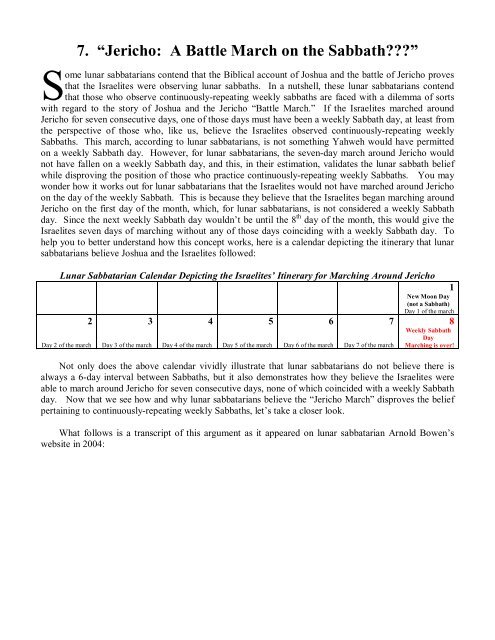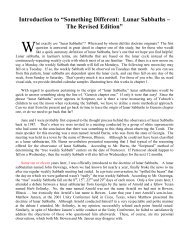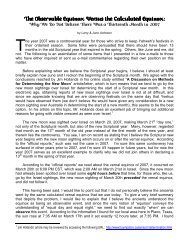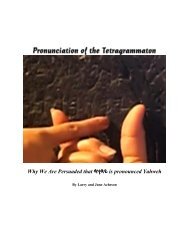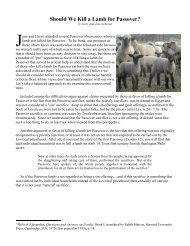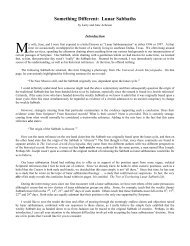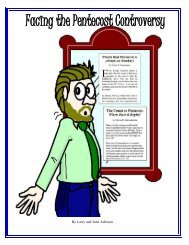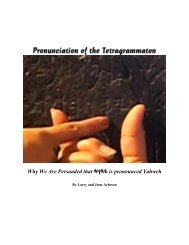Jericho: A Battle March on the Sabbath??? - Ponder Scripture
Jericho: A Battle March on the Sabbath??? - Ponder Scripture
Jericho: A Battle March on the Sabbath??? - Ponder Scripture
Create successful ePaper yourself
Turn your PDF publications into a flip-book with our unique Google optimized e-Paper software.
7. “<str<strong>on</strong>g>Jericho</str<strong>on</strong>g>: A <str<strong>on</strong>g>Battle</str<strong>on</strong>g> <str<strong>on</strong>g>March</str<strong>on</strong>g> <strong>on</strong> <strong>the</strong> <strong>Sabbath</strong>”<br />
Some lunar sabbatarians c<strong>on</strong>tend that <strong>the</strong> Biblical account of Joshua and <strong>the</strong> battle of <str<strong>on</strong>g>Jericho</str<strong>on</strong>g> proves<br />
that <strong>the</strong> Israelites were observing lunar sabbaths. In a nutshell, <strong>the</strong>se lunar sabbatarians c<strong>on</strong>tend<br />
that those who observe c<strong>on</strong>tinuously-repeating weekly sabbaths are faced with a dilemma of sorts<br />
with regard to <strong>the</strong> story of Joshua and <strong>the</strong> <str<strong>on</strong>g>Jericho</str<strong>on</strong>g> “<str<strong>on</strong>g>Battle</str<strong>on</strong>g> <str<strong>on</strong>g>March</str<strong>on</strong>g>.” If <strong>the</strong> Israelites marched around<br />
<str<strong>on</strong>g>Jericho</str<strong>on</strong>g> for seven c<strong>on</strong>secutive days, <strong>on</strong>e of those days must have been a weekly <strong>Sabbath</strong> day, at least from<br />
<strong>the</strong> perspective of those who, like us, believe <strong>the</strong> Israelites observed c<strong>on</strong>tinuously-repeating weekly<br />
<strong>Sabbath</strong>s. This march, according to lunar sabbatarians, is not something Yahweh would have permitted<br />
<strong>on</strong> a weekly <strong>Sabbath</strong> day. However, for lunar sabbatarians, <strong>the</strong> seven-day march around <str<strong>on</strong>g>Jericho</str<strong>on</strong>g> would<br />
not have fallen <strong>on</strong> a weekly <strong>Sabbath</strong> day, and this, in <strong>the</strong>ir estimati<strong>on</strong>, validates <strong>the</strong> lunar sabbath belief<br />
while disproving <strong>the</strong> positi<strong>on</strong> of those who practice c<strong>on</strong>tinuously-repeating weekly <strong>Sabbath</strong>s. You may<br />
w<strong>on</strong>der how it works out for lunar sabbatarians that <strong>the</strong> Israelites would not have marched around <str<strong>on</strong>g>Jericho</str<strong>on</strong>g><br />
<strong>on</strong> <strong>the</strong> day of <strong>the</strong> weekly <strong>Sabbath</strong>. This is because <strong>the</strong>y believe that <strong>the</strong> Israelites began marching around<br />
<str<strong>on</strong>g>Jericho</str<strong>on</strong>g> <strong>on</strong> <strong>the</strong> first day of <strong>the</strong> m<strong>on</strong>th, which, for lunar sabbatarians, is not c<strong>on</strong>sidered a weekly <strong>Sabbath</strong><br />
day. Since <strong>the</strong> next weekly <strong>Sabbath</strong> day wouldn’t be until <strong>the</strong> 8 th day of <strong>the</strong> m<strong>on</strong>th, this would give <strong>the</strong><br />
Israelites seven days of marching without any of those days coinciding with a weekly <strong>Sabbath</strong> day. To<br />
help you to better understand how this c<strong>on</strong>cept works, here is a calendar depicting <strong>the</strong> itinerary that lunar<br />
sabbatarians believe Joshua and <strong>the</strong> Israelites followed:<br />
Lunar Sabbatarian Calendar Depicting <strong>the</strong> Israelites’ Itinerary for <str<strong>on</strong>g>March</str<strong>on</strong>g>ing Around <str<strong>on</strong>g>Jericho</str<strong>on</strong>g><br />
2<br />
Day 2 of <strong>the</strong> march<br />
3<br />
Day 3 of <strong>the</strong> march<br />
4<br />
Day 4 of <strong>the</strong> march<br />
5<br />
Day 5 of <strong>the</strong> march<br />
6<br />
Day 6 of <strong>the</strong> march<br />
7<br />
Day 7 of <strong>the</strong> march<br />
1<br />
New Mo<strong>on</strong> Day<br />
(not a <strong>Sabbath</strong>)<br />
Day 1 of <strong>the</strong> march<br />
8<br />
Weekly <strong>Sabbath</strong><br />
Day<br />
<str<strong>on</strong>g>March</str<strong>on</strong>g>ing is over!<br />
Not <strong>on</strong>ly does <strong>the</strong> above calendar vividly illustrate that lunar sabbatarians do not believe <strong>the</strong>re is<br />
always a 6-day interval between <strong>Sabbath</strong>s, but it also dem<strong>on</strong>strates how <strong>the</strong>y believe <strong>the</strong> Israelites were<br />
able to march around <str<strong>on</strong>g>Jericho</str<strong>on</strong>g> for seven c<strong>on</strong>secutive days, n<strong>on</strong>e of which coincided with a weekly <strong>Sabbath</strong><br />
day. Now that we see how and why lunar sabbatarians believe <strong>the</strong> “<str<strong>on</strong>g>Jericho</str<strong>on</strong>g> <str<strong>on</strong>g>March</str<strong>on</strong>g>” disproves <strong>the</strong> belief<br />
pertaining to c<strong>on</strong>tinuously-repeating weekly <strong>Sabbath</strong>s, let’s take a closer look.<br />
What follows is a transcript of this argument as it appeared <strong>on</strong> lunar sabbatarian Arnold Bowen’s<br />
website in 2004:
2<br />
Something Different: Lunar <strong>Sabbath</strong>s<br />
JERICHO: A BATTLE MARCH ON THE SABBATH<br />
By Arnold Bowen<br />
Have you ever w<strong>on</strong>dered how <strong>the</strong> children of Israel could have marched around <str<strong>on</strong>g>Jericho</str<strong>on</strong>g> without<br />
marching <strong>on</strong> <strong>the</strong> <strong>Sabbath</strong> Maybe you have, maybe you have not. Maybe you have thought that it was<br />
simply allowed by Yahweh, and is a case of exempti<strong>on</strong> in battle. What ever you have previously<br />
understood c<strong>on</strong>cerning this colossal event, here is something to c<strong>on</strong>sider.<br />
Let me point out that those who believe <strong>the</strong> <strong>Sabbath</strong> to be a reoccurring seven day count, have to<br />
admit that Israel marched around <strong>the</strong> city of <str<strong>on</strong>g>Jericho</str<strong>on</strong>g> <strong>on</strong> <strong>the</strong> weekly <strong>Sabbath</strong> day. This is seen in <strong>the</strong> book<br />
of Joshua 6:2-4.<br />
And Yahweh said unto Joshua, See, I have given into thine hand <str<strong>on</strong>g>Jericho</str<strong>on</strong>g>, and <strong>the</strong><br />
king <strong>the</strong>reof, and <strong>the</strong> mighty men of valor. And ye shall compass <strong>the</strong> city, all ye men<br />
of war, and go round about <strong>the</strong> city <strong>on</strong>ce. Thus shalt thou do six days. And <strong>the</strong> seven<br />
priests shall bear before <strong>the</strong> ark seven trumpets or rams’ horns: and <strong>the</strong> seventh day<br />
ye shall compass <strong>the</strong> city seven times, and <strong>the</strong> priests shall blow with <strong>the</strong> trumpets.<br />
Seeing that <strong>the</strong> march was commanded by Yahweh to last for seven c<strong>on</strong>secutive days, a weekly<br />
<strong>Sabbath</strong> would definitely fall within <strong>the</strong> period of <strong>the</strong> seven day march; at least for those who hold to a<br />
c<strong>on</strong>tinuous seven day count, not anchored in any way by nature.<br />
Up<strong>on</strong> realizing this, we should notice what Yahweh has revealed to us, in His holy word, c<strong>on</strong>cerning<br />
travel <strong>on</strong> <strong>the</strong> weekly <strong>Sabbath</strong> day. Is travel allowed <strong>on</strong> <strong>the</strong> <strong>Sabbath</strong> Or does Yahweh explicitly c<strong>on</strong>demn<br />
travel <strong>on</strong> <strong>the</strong> <strong>Sabbath</strong><br />
In Exodus 16 we find <strong>the</strong> account of <strong>the</strong> giving of <strong>the</strong> manna by Yahweh to <strong>the</strong> children of Israel. He<br />
makes it known to <strong>the</strong>m (in verses 4-5 of this account) that <strong>the</strong>y will be receiving manna for six straight<br />
days, but <strong>on</strong>e <strong>the</strong> seventh day <strong>the</strong>y will find n<strong>on</strong>e. On <strong>the</strong> sixth day of this particular week Yahweh<br />
commands <strong>the</strong>m to bake that which <strong>the</strong>y will, and see<strong>the</strong> that which <strong>the</strong>y will (vs. 23). Food preparati<strong>on</strong> is<br />
also found in verse 5 of <strong>the</strong> chapter. We do however find that immediately after Yahweh instructs Israel<br />
in that <strong>the</strong>re would be no manna found <strong>on</strong> <strong>the</strong> <strong>Sabbath</strong> day, we find that <strong>the</strong>y simply did not hearken.<br />
And it came to pass, that <strong>the</strong>re went out some of <strong>the</strong> people <strong>on</strong> <strong>the</strong> seventh day for to<br />
ga<strong>the</strong>r, and <strong>the</strong>y found n<strong>on</strong>e [manna]. Exodus 16:27<br />
Up<strong>on</strong> <strong>the</strong> children of Israel’s venture Yahweh was very displeased. We see this in His statements to<br />
Moses in Exodus 16:28-29.<br />
…Yahweh said unto Moses, How l<strong>on</strong>g refuse ye to keep my commandments and my<br />
laws See, for that Yahweh hath given you <strong>the</strong> <strong>Sabbath</strong>, <strong>the</strong>refore he giveth you <strong>on</strong><br />
<strong>the</strong> sixth day <strong>the</strong> bread of two days; abide ye every man in his place, let no man go<br />
out of his place <strong>on</strong> <strong>the</strong> seventh day. So <strong>the</strong> people rested <strong>on</strong> <strong>the</strong> seventh day.<br />
Yahweh here specifically c<strong>on</strong>demns <strong>the</strong>ir traveling <strong>on</strong> <strong>the</strong> <strong>Sabbath</strong>. This was merely traveling a short<br />
space to ga<strong>the</strong>r manna, much less instigating an attack through a battle march. Obviously Yahweh does<br />
desire us to travel to our places of worship <strong>on</strong> <strong>Sabbath</strong>, but something unnecessary, such as ga<strong>the</strong>ring<br />
manna or traveling for our own pers<strong>on</strong>al edificati<strong>on</strong> is something altoge<strong>the</strong>r different.<br />
We also see that limited travel <strong>on</strong> <strong>the</strong> <strong>Sabbath</strong> was understood by <strong>the</strong> believers of <strong>the</strong> 1st century A.D.<br />
This can be seen in <strong>the</strong> book of Acts 1:12.<br />
Then returned <strong>the</strong>y unto Jerusalem from <strong>the</strong> mount called Olivet, which is from<br />
Jerusalem a <strong>Sabbath</strong> day’s journey.<br />
Here we see that <strong>the</strong>re was a specific distance that was c<strong>on</strong>sidered to be a <strong>Sabbath</strong> day’s journey. The<br />
King James Study <strong>Scripture</strong>s states, “A <strong>Sabbath</strong> day’s journey was <strong>the</strong> distance a Jew was allowed to<br />
travel <strong>on</strong> <strong>the</strong> <strong>Sabbath</strong> (about 2/3 mile).” Smith’s <strong>Scripture</strong>s Dicti<strong>on</strong>ary has somewhat to add <strong>on</strong> <strong>the</strong><br />
passage in Acts as well.
Something Different: Lunar <strong>Sabbath</strong>s<br />
3<br />
…The <strong>Sabbath</strong> day’s journey of 2000 cubits, Acts 1:12, is peculiar to <strong>the</strong> New<br />
Testament, and arose from a rabbinical restricti<strong>on</strong>. It was founded <strong>on</strong> a universal<br />
applicati<strong>on</strong> of <strong>the</strong> prohibiti<strong>on</strong> given by Moses for a special occasi<strong>on</strong>: ‘Let no man go<br />
out of his place <strong>on</strong> <strong>the</strong> seventh day.” Ex. 16:29. An excepti<strong>on</strong> was allowed for <strong>the</strong><br />
purpose of worshipping at <strong>the</strong> tabernacle…[1]<br />
Although Mr. Smith’s opini<strong>on</strong> leans toward this being an applicati<strong>on</strong> by man, I think we can see from<br />
<strong>the</strong> passage in Exodus 16:29 that no unnecessary travel was to be d<strong>on</strong>e <strong>on</strong> <strong>the</strong> <strong>Sabbath</strong>. Acts 1:12 simply<br />
shows us that this is what was understood by Israelites living in <strong>the</strong> 1st century A.D<br />
So, did Yahweh command a battle attack c<strong>on</strong>sisting of a march to take place <strong>on</strong> <strong>the</strong> <strong>Sabbath</strong> Well,<br />
<strong>on</strong>ce again, for those insisting <strong>on</strong> a c<strong>on</strong>tinual unbroken seven day count for <strong>the</strong> <strong>Sabbath</strong>, <strong>the</strong> answer<br />
would have to be yes. And I’m sure <strong>on</strong>e could give a few answers to why Yahweh seemed to allow this to<br />
take place. However, is <strong>the</strong>re any possibility that Yahweh did not command a march to take place <strong>on</strong> <strong>the</strong><br />
<strong>Sabbath</strong> Yes, <strong>the</strong>re certainly is.<br />
According to <strong>the</strong> teaching which claims <strong>the</strong> <strong>Sabbath</strong> to be fixed in <strong>the</strong> heavens according to <strong>the</strong> mo<strong>on</strong><br />
and its phases, a <strong>Sabbath</strong> falls out to be <strong>on</strong> <strong>the</strong> 8th, 15th, 22nd, and 29th days of each and every lunati<strong>on</strong>.<br />
Reas<strong>on</strong> being is that <strong>the</strong> day of <strong>the</strong> New Mo<strong>on</strong> is not counted as <strong>on</strong>e of <strong>the</strong> six working days (Ezekiel<br />
46:1-3) thus <strong>the</strong> <strong>Sabbath</strong> count stops <strong>on</strong>ce each m<strong>on</strong>th at <strong>the</strong> day of <strong>the</strong> New Mo<strong>on</strong>. If <strong>the</strong> march of<br />
<str<strong>on</strong>g>Jericho</str<strong>on</strong>g> started <strong>on</strong> <strong>the</strong> day of <strong>the</strong> New Mo<strong>on</strong> <strong>the</strong>n it would have ended <strong>on</strong> <strong>the</strong> 7th day of that m<strong>on</strong>th! This<br />
would allow for Israel to not have traveled <strong>on</strong> <strong>the</strong> <strong>Sabbath</strong>! However, we do face a dilemma; <strong>the</strong> book of<br />
Joshua does not give us any c<strong>on</strong>clusive evidence that <strong>the</strong> march began <strong>on</strong> <strong>the</strong> New Mo<strong>on</strong>. This is why I<br />
would now like to direct your attenti<strong>on</strong> to what is known as <strong>the</strong> book of Jasher.<br />
The book of Jasher is menti<strong>on</strong>ed twice in <strong>the</strong> holy scriptures, and was c<strong>on</strong>sidered as an h<strong>on</strong>orable<br />
source of informati<strong>on</strong>. This is seen by noticing <strong>the</strong> c<strong>on</strong>text in which it was menti<strong>on</strong>ed.[2] 1<br />
Before we give our resp<strong>on</strong>se to <strong>the</strong> above commentary, I believe it would be helpful to carefully read<br />
<strong>the</strong> account of Joshua and <strong>the</strong> battle of <str<strong>on</strong>g>Jericho</str<strong>on</strong>g>, as found in Joshua 6:1-21:<br />
1 Now <str<strong>on</strong>g>Jericho</str<strong>on</strong>g> was straitly shut up because of <strong>the</strong> children of Israel: n<strong>on</strong>e went out, and<br />
n<strong>on</strong>e came in.<br />
2 And Yahweh said unto Joshua, See, I have given into thine hand <str<strong>on</strong>g>Jericho</str<strong>on</strong>g>, and <strong>the</strong> king<br />
<strong>the</strong>reof, and <strong>the</strong> mighty men of valour.<br />
3 And ye shall compass <strong>the</strong> city, all ye men of war, and go round about <strong>the</strong> city <strong>on</strong>ce. Thus<br />
shalt thou do six days.<br />
4 And seven priests shall bear before <strong>the</strong> ark seven trumpets of rams' horns: and <strong>the</strong><br />
seventh day ye shall compass <strong>the</strong> city seven times, and <strong>the</strong> priests shall blow with <strong>the</strong><br />
trumpets.<br />
5 And it shall come to pass, that when <strong>the</strong>y make a l<strong>on</strong>g blast with <strong>the</strong> ram's horn, and<br />
when ye hear <strong>the</strong> sound of <strong>the</strong> trumpet, all <strong>the</strong> people shall shout with a great shout; and<br />
<strong>the</strong> wall of <strong>the</strong> city shall fall down flat, and <strong>the</strong> people shall ascend up every man straight<br />
before him.<br />
1<br />
This study may be read <strong>on</strong>line by accessing <strong>the</strong> following URL: http://lunarsabbath.org/<str<strong>on</strong>g>Jericho</str<strong>on</strong>g>%20<str<strong>on</strong>g>March</str<strong>on</strong>g>%202.html. I<br />
have also found variati<strong>on</strong>s of Arnold’s study <strong>on</strong> o<strong>the</strong>r web sites. Arnold posted this same commentary in a thread entitled<br />
“NEW/OLD evidence <strong>on</strong> Lunar Shabat, very compelling!” <strong>on</strong> 04-25-2004 at 06:08 PM in <strong>the</strong> now-defunct “True <strong>Sabbath</strong>”<br />
forum at www.eliyah.com.
4<br />
Something Different: Lunar <strong>Sabbath</strong>s<br />
6 And Joshua <strong>the</strong> s<strong>on</strong> of Nun called <strong>the</strong> priests, and said unto <strong>the</strong>m, Take up <strong>the</strong> ark of <strong>the</strong><br />
covenant, and let seven priests bear seven trumpets of rams' horns before <strong>the</strong> ark of<br />
Yahweh.<br />
7 And he said unto <strong>the</strong> people, Pass <strong>on</strong>, and compass <strong>the</strong> city, and let him that is armed<br />
pass <strong>on</strong> before <strong>the</strong> ark of Yahweh.<br />
8 And it came to pass, when Joshua had spoken unto <strong>the</strong> people, that <strong>the</strong> seven priests<br />
bearing <strong>the</strong> seven trumpets of rams' horns passed <strong>on</strong> before Yahweh, and blew with <strong>the</strong><br />
trumpets: and <strong>the</strong> ark of <strong>the</strong> covenant of Yahweh followed <strong>the</strong>m.<br />
9 And <strong>the</strong> armed men went before <strong>the</strong> priests that blew with <strong>the</strong> trumpets, and <strong>the</strong> rearward<br />
came after <strong>the</strong> ark, <strong>the</strong> priests going <strong>on</strong>, and blowing with <strong>the</strong> trumpets.<br />
10 And Joshua had commanded <strong>the</strong> people, saying, Ye shall not shout, nor make any noise<br />
with your voice, nei<strong>the</strong>r shall any word proceed out of your mouth, until <strong>the</strong> day I bid you<br />
shout; <strong>the</strong>n shall ye shout.<br />
11 So <strong>the</strong> ark of Yahweh compassed <strong>the</strong> city, going about it <strong>on</strong>ce: and <strong>the</strong>y came into <strong>the</strong><br />
camp, and lodged in <strong>the</strong> camp.<br />
12 And Joshua rose early in <strong>the</strong> morning, and <strong>the</strong> priests took up <strong>the</strong> ark of Yahweh.<br />
13 And seven priests bearing seven trumpets of rams' horns before <strong>the</strong> ark of Yahweh went<br />
<strong>on</strong> c<strong>on</strong>tinually, and blew with <strong>the</strong> trumpets: and <strong>the</strong> armed men went before <strong>the</strong>m; but <strong>the</strong><br />
rearward came after <strong>the</strong> ark of Yahweh, <strong>the</strong> priests going <strong>on</strong>, and blowing with <strong>the</strong><br />
trumpets.<br />
14 And <strong>the</strong> sec<strong>on</strong>d day <strong>the</strong>y compassed <strong>the</strong> city <strong>on</strong>ce, and returned into <strong>the</strong> camp: so <strong>the</strong>y<br />
did six days.<br />
15 And it came to pass <strong>on</strong> <strong>the</strong> seventh day, that <strong>the</strong>y rose early about <strong>the</strong> dawning of <strong>the</strong><br />
day, and compassed <strong>the</strong> city after <strong>the</strong> same manner seven times: <strong>on</strong>ly <strong>on</strong> that day <strong>the</strong>y<br />
compassed <strong>the</strong> city seven times.<br />
16 And it came to pass at <strong>the</strong> seventh time, when <strong>the</strong> priests blew with <strong>the</strong> trumpets, Joshua<br />
said unto <strong>the</strong> people, Shout; for Yahweh hath given you <strong>the</strong> city.<br />
17 And <strong>the</strong> city shall be accursed, even it, and all that are <strong>the</strong>rein, to Yahweh: <strong>on</strong>ly Rahab<br />
<strong>the</strong> harlot shall live, she and all that are with her in <strong>the</strong> house, because she hid <strong>the</strong><br />
messengers that we sent.<br />
18 And ye, in any wise keep yourselves from <strong>the</strong> accursed thing, lest ye make yourselves<br />
accursed, when ye take of <strong>the</strong> accursed thing, and make <strong>the</strong> camp of Israel a curse, and<br />
trouble it.<br />
19 But all <strong>the</strong> silver, and gold, and vessels of brass and ir<strong>on</strong>, are c<strong>on</strong>secrated unto Yahweh:<br />
<strong>the</strong>y shall come into <strong>the</strong> treasury of Yahweh.<br />
20 So <strong>the</strong> people shouted when <strong>the</strong> priests blew with <strong>the</strong> trumpets: and it came to pass,<br />
when <strong>the</strong> people heard <strong>the</strong> sound of <strong>the</strong> trumpet, and <strong>the</strong> people shouted with a great<br />
shout, that <strong>the</strong> wall fell down flat, so that <strong>the</strong> people went up into <strong>the</strong> city, every man<br />
straight before him, and <strong>the</strong>y took <strong>the</strong> city.<br />
21 And <strong>the</strong>y utterly destroyed all that was in <strong>the</strong> city, both man and woman, young and old,<br />
and ox, and sheep, and ass, with <strong>the</strong> edge of <strong>the</strong> sword.<br />
Quickly summarizing <strong>the</strong> above account, please notice that <strong>the</strong> “men of war” (not <strong>the</strong> general<br />
populace) compassed <strong>the</strong> city of <str<strong>on</strong>g>Jericho</str<strong>on</strong>g> <strong>on</strong>ce a day for six days, followed by seven priests who were<br />
blowing trumpets of rams’ horns, as well as <strong>the</strong> priests who carried <strong>the</strong> Ark of <strong>the</strong> Covenant. Also, please<br />
notice that no menti<strong>on</strong> is made of <strong>the</strong> weekly <strong>Sabbath</strong> in <strong>the</strong> above account. We menti<strong>on</strong> this important<br />
fact, even though <strong>the</strong>re is no questi<strong>on</strong> that <strong>the</strong> Israelites were in <strong>the</strong> habit of observing that day as a day of<br />
rest. The reas<strong>on</strong> I’m calling <strong>the</strong>se aspects of <strong>the</strong> story to your attenti<strong>on</strong> is because, back in 2004, while
Something Different: Lunar <strong>Sabbath</strong>s<br />
5<br />
engaged in an <strong>on</strong>line forum discussi<strong>on</strong> about this topic with a lunar sabbatarian, he exaggerated <strong>the</strong> above<br />
account, trying to make it appear as though all <strong>the</strong> Israelites were burdened with heavy battle armor each<br />
of those seven days, and that <strong>the</strong>y must have laboriously trudged around <strong>the</strong> immense city of <str<strong>on</strong>g>Jericho</str<strong>on</strong>g>, and<br />
when <strong>the</strong> grueling march was over, <strong>the</strong>y returned to camp thoroughly exhausted … and this is not a<br />
command <strong>on</strong>e would expect Yahweh to execute <strong>on</strong> <strong>the</strong> day of <strong>the</strong> weekly <strong>Sabbath</strong>. At least this was <strong>the</strong><br />
perspective presented by <strong>the</strong> lunar sabbatarian in <strong>the</strong> course of our discussi<strong>on</strong>. Here is an excerpt from<br />
what he wrote:<br />
Would Yahweh's people load <strong>the</strong>mselves with battle armor and march to battle <strong>on</strong> a<br />
sabbath 2<br />
The above lunar sabbatarian attempted to embellish <strong>the</strong> account of <strong>the</strong> battle of <str<strong>on</strong>g>Jericho</str<strong>on</strong>g>, most likely<br />
because presenting a mental picture of people trudging around in battle armor <strong>on</strong> a <strong>Sabbath</strong> day carries<br />
with it an added image of disregard for <strong>the</strong> sanctity of <strong>the</strong> <strong>Sabbath</strong> … or to be more specific, disregard for<br />
<strong>the</strong> sanctity of <strong>the</strong> c<strong>on</strong>tinuously-repeating weekly <strong>Sabbath</strong>. However, as I am about to dem<strong>on</strong>strate, in<br />
presenting <strong>the</strong> “battle march” in this light, <strong>the</strong> lunar sabbatarian distorted <strong>the</strong> account. When we carefully<br />
examine <strong>the</strong> entire story, we do not find that any Israelites carried any battle armor, thus exposing <strong>the</strong><br />
lunar sabbatarian’s efforts as an attempt to embellish <strong>the</strong> account in order to make things seem much more<br />
arduous than <strong>the</strong>y really were. If he can succeed at persuading us that this truly was a laborious<br />
undertaking, he knows we’ll be that much closer to agreeing with his point. However, we now know that<br />
he was reading a few things into this passage that simply aren't <strong>the</strong>re. Again, we are simply not told that<br />
<strong>the</strong> Israelite army d<strong>on</strong>ned "battle armor,” and we should also be careful to note that instead of choosing<br />
<strong>the</strong> words “Yahweh’s people,” which seems inclusive of <strong>the</strong> entire nati<strong>on</strong> of Israel, <strong>the</strong> lunar sabbatarian<br />
should have explained that it was <strong>the</strong> “men of war,” accompanied by seven priests, as well as <strong>the</strong> priests<br />
who bore <strong>the</strong> Ark of <strong>the</strong> Covenant. These were <strong>the</strong> <strong>on</strong>ly Israelites involved in <strong>the</strong> “<str<strong>on</strong>g>Jericho</str<strong>on</strong>g> march.”<br />
As we c<strong>on</strong>template this event, we should also c<strong>on</strong>sider <strong>the</strong> following facts: <str<strong>on</strong>g>March</str<strong>on</strong>g>ing around <strong>the</strong> city<br />
of <str<strong>on</strong>g>Jericho</str<strong>on</strong>g> <strong>on</strong>e time would most definitely fall within <strong>the</strong> parameters of what is known as a "<strong>Sabbath</strong><br />
Days' Journey" (Acts 1:13). The circumference of <str<strong>on</strong>g>Jericho</str<strong>on</strong>g> was <strong>on</strong>ly around 650 yards. 3 At most, <str<strong>on</strong>g>Jericho</str<strong>on</strong>g><br />
could <strong>on</strong>ly have been 6/10 of a mile in circumference, which is well under <strong>the</strong> "<strong>Sabbath</strong> day's journey"<br />
limit traditi<strong>on</strong>ally understood by Judaism. According to <strong>the</strong> New Internati<strong>on</strong>al Versi<strong>on</strong> of <strong>the</strong> Bible,<br />
footnote for Acts 1:13, a "<strong>Sabbath</strong> day's journey" c<strong>on</strong>sists of ¾ of a mile. According to Webster-<br />
2 Excerpt from an <strong>on</strong>line posting submitted by Paul Kendall in <strong>the</strong> “True <strong>Sabbath</strong>” forum, which is a private forum set up by<br />
<strong>the</strong> forum owner, who goes by “EliYah,” at www.eliyah.com. This particular posting was submitted <strong>on</strong> 02-07-2004 at 12:45<br />
PM in <strong>the</strong> forum thread entitled Seven c<strong>on</strong>secutive days of work.<br />
3 This informati<strong>on</strong> can be verified by accessing Bible Gateway’s website, where we can read <strong>the</strong> account of Joshua and <strong>the</strong><br />
<str<strong>on</strong>g>Battle</str<strong>on</strong>g> of <str<strong>on</strong>g>Jericho</str<strong>on</strong>g>, al<strong>on</strong>g with <strong>the</strong> following commentary: “Joshua 6:15 Any walled town was called a ‘city’ and its headman<br />
was called ‘a king’ in ancient times, but <strong>the</strong> fact that Joshua's army could march around <strong>the</strong> whole of <str<strong>on</strong>g>Jericho</str<strong>on</strong>g> seven times in <strong>on</strong>e<br />
day shows that it was a very small place. Sir Charles Marst<strong>on</strong> (New Bible Evidence) echoes <strong>the</strong> reports of o<strong>the</strong>r archaeologists<br />
when he says that <strong>the</strong> excavati<strong>on</strong>s of ancient <str<strong>on</strong>g>Jericho</str<strong>on</strong>g> do not c<strong>on</strong>firm <strong>the</strong> c<strong>on</strong>cepti<strong>on</strong>s of our youth. Though <strong>the</strong> walls were so<br />
formidable, <strong>the</strong> area <strong>the</strong>y enclosed <strong>on</strong>ly measures seven acres. The whole circumference of <strong>the</strong> city was about 650 yards. Our<br />
disappointment is somewhat modified by <strong>the</strong> fact that Jebusite Jerusalem, which David captured, was about <strong>the</strong> same size.<br />
Schliemann experienced a similar disillusi<strong>on</strong>ment in 1873 when he excavated <strong>the</strong> city of Troy, which Homer tells us so l<strong>on</strong>g<br />
withstood <strong>the</strong> Grecian hosts. Indeed it would almost seem that <strong>the</strong>se ancient cities were more in <strong>the</strong> nature of places of refuge<br />
resorted to when an enemy approached. Under peaceful c<strong>on</strong>diti<strong>on</strong>s a large proporti<strong>on</strong> of <strong>the</strong> inhabitants would dwell outside<br />
<strong>the</strong> city's walls (Sir Charles Marst<strong>on</strong>, New Bible Evidence).” Taken from <strong>the</strong> following URL:<br />
http://bible.gospelcom.net/biblelanguage=english&passage=JOSH+6&versi<strong>on</strong>=AMP
6<br />
Something Different: Lunar <strong>Sabbath</strong>s<br />
Dicti<strong>on</strong>ary.net, it is <strong>on</strong>e mile. 4 When combine <strong>the</strong>se facts with <strong>the</strong> understanding that <strong>the</strong>re are 1,760<br />
yards in a mile, it should become very clear that nei<strong>the</strong>r <strong>the</strong> Israelite men of war nor <strong>the</strong> priests who<br />
accompanied <strong>the</strong>m came close to violating <strong>the</strong> “<strong>Sabbath</strong> day’s journey” limit.<br />
I should add that even in ancient times, guards were regularly <strong>on</strong> duty during <strong>the</strong> <strong>Sabbath</strong> (Nehemiah<br />
13:19-21), and when we take into c<strong>on</strong>siderati<strong>on</strong> <strong>the</strong> fact that <strong>the</strong> high priest Jehoiada used priest-guards <strong>on</strong><br />
<strong>the</strong> <strong>Sabbath</strong> to overthrow <strong>the</strong> evil queen Athaliah (II Kings 11 and II Chr<strong>on</strong>icles 23), we can better<br />
understand that under certain circumstances, especially during times of duress, Yahweh’s people must be<br />
prepared to engage in acts of violence, even <strong>on</strong> <strong>the</strong> <strong>Sabbath</strong> day. This is not to say that we believe <strong>the</strong><br />
Israelites overthrew <strong>the</strong> city of <str<strong>on</strong>g>Jericho</str<strong>on</strong>g> <strong>on</strong> <strong>the</strong> weekly <strong>Sabbath</strong> day; but <strong>the</strong> men of war were certainly<br />
prepared to defend <strong>the</strong> Israelites if <strong>the</strong> people of <str<strong>on</strong>g>Jericho</str<strong>on</strong>g> had carried out any acts of aggressi<strong>on</strong> <strong>on</strong> that<br />
day. 5 We should also point out that in <strong>the</strong> example of overthrowing Queen Athaliah, it wasn’t until <strong>the</strong><br />
queen had given orders to kill those resp<strong>on</strong>sible for crowning Joash king that <strong>the</strong> priests had her killed. 6<br />
Summing things up thus far, we see that Yahweh had <strong>the</strong> Israelite army, plus seven priests (as well as<br />
those carrying <strong>the</strong> Ark of <strong>the</strong> Covenant), marching around a city whose circumference was less than ¾ of<br />
a mile, carrying swords and trumpets. No battle gear is menti<strong>on</strong>ed. We would hardly c<strong>on</strong>sider this a<br />
violati<strong>on</strong> of <strong>the</strong> <strong>Sabbath</strong>.<br />
However, I would like to go <strong>on</strong>e step fur<strong>the</strong>r. As we all (hopefully) know, any time Yahweh<br />
commands us to do something, it is law. In seeing to it that His law was carried out, Yahweh commanded<br />
that <strong>the</strong> priests perform certain functi<strong>on</strong>s <strong>on</strong> <strong>the</strong> <strong>Sabbath</strong> day that are unlawful for <strong>the</strong> general populace to<br />
do. As <strong>the</strong> Messiah stated in Mat<strong>the</strong>w 12:5, "Or have ye not read in <strong>the</strong> law, how that <strong>on</strong> <strong>the</strong> sabbath days<br />
<strong>the</strong> priests in <strong>the</strong> temple profane <strong>the</strong> sabbath, and are blameless"<br />
As He made clear, <strong>the</strong>re was a distincti<strong>on</strong> between <strong>the</strong> priests and <strong>the</strong> rest of <strong>the</strong> people. However, at<br />
certain times, Yahweh gave every<strong>on</strong>e commandment to carry out certain functi<strong>on</strong>s that might o<strong>the</strong>rwise<br />
have been unlawful to do <strong>on</strong> <strong>the</strong> <strong>Sabbath</strong>. One example of this involved <strong>the</strong> killing of <strong>the</strong> Passover lambs.<br />
As Philo pointed out, <strong>on</strong> that <strong>on</strong>e day each year, Yahweh appointed <strong>the</strong> entire nati<strong>on</strong> of Israel as priests<br />
for slaying <strong>the</strong> lambs. 7 In <strong>the</strong> same way, if Yahweh commands me to march around a city <strong>on</strong> <strong>the</strong> <strong>Sabbath</strong>,<br />
I will do it, and I will not be violating any law ... simply because His Word is law.<br />
44 This informati<strong>on</strong> was taken from <strong>the</strong> following URL:<br />
http://www.webster-dicti<strong>on</strong>ary.net/definiti<strong>on</strong>/<strong>Sabbath</strong>-day's%20journey<br />
5 Cf., I Maccabees 2:31-41, where Mattathias and his fellow Jews, after hearing <strong>the</strong> report of faithful Jews being mercilessly<br />
killed when <strong>the</strong>y refused to fight <strong>on</strong> <strong>the</strong> <strong>Sabbath</strong>, resolved to fight defensively <strong>on</strong> <strong>the</strong> <strong>Sabbath</strong> day. See also Josephus in<br />
Antiquities of <strong>the</strong> Jews, Book XII, ch. VI, sec. 2, where he records <strong>the</strong> speech given by Mattathias, adding, “This speech<br />
persuaded <strong>the</strong>m; and this rule c<strong>on</strong>tinues am<strong>on</strong>g us to this day, that if <strong>the</strong>re be a necessity, we may fight <strong>on</strong> <strong>Sabbath</strong>-days.”<br />
6 This informati<strong>on</strong> is not gleaned from <strong>the</strong> Scriptural account, but ra<strong>the</strong>r from <strong>the</strong> account supplied by Josephus in Antiquities<br />
of <strong>the</strong> Jews, Book IX, ch. VII, sec. 3, where we read, “But when Athaliah saw <strong>the</strong> child standing up<strong>on</strong> a pillar, with <strong>the</strong> royal<br />
crown up<strong>on</strong> his head, she rent her clo<strong>the</strong>s, and cried out vehemently, and commanded [her guards] to kill him that had laid<br />
snares for her, and endeavored to deprive her of <strong>the</strong> government.” As menti<strong>on</strong>ed in our previous footnote, Josephus understood<br />
that Jews <strong>on</strong>ly acted defensively <strong>on</strong> <strong>the</strong> day of <strong>the</strong> weekly <strong>Sabbath</strong> (Wars of <strong>the</strong> Jews, Book I, ch. VII, sec. 3).<br />
7 Cf., The Works of Philo, translated by C.D. Y<strong>on</strong>ge, “The Decalogue,” ch. XXX (159).
Something Different: Lunar <strong>Sabbath</strong>s<br />
7<br />
The Book of Jasher’s Account of <strong>the</strong> <str<strong>on</strong>g>March</str<strong>on</strong>g> Around <str<strong>on</strong>g>Jericho</str<strong>on</strong>g><br />
In reading <strong>the</strong> commentary authored by Arnold Bowen, you may have noticed a puzzling c<strong>on</strong>clusi<strong>on</strong><br />
that seems disc<strong>on</strong>nected from what he had previously written. If we knew nothing else about Arnold’s<br />
belief <strong>on</strong> this subject, we might c<strong>on</strong>clude that his mind wandered <strong>on</strong> to some unrelated topic. As it is,<br />
however, this is simply a case of Arnold not completing his thought process. I am alluding to his<br />
reference of <strong>the</strong> Book of Jasher. 8 Arnold mysteriously ends his study with <strong>the</strong> following brief remark:<br />
“This is why I would now like to direct your attenti<strong>on</strong> to what is known as <strong>the</strong> book of Jasher. The book<br />
of Jasher is menti<strong>on</strong>ed twice in <strong>the</strong> holy scriptures, and was c<strong>on</strong>sidered as an h<strong>on</strong>orable source of<br />
informati<strong>on</strong>. This is seen by noticing <strong>the</strong> c<strong>on</strong>text in which it was menti<strong>on</strong>ed.” The obvious questi<strong>on</strong> <strong>on</strong>e<br />
might have after reading <strong>the</strong> above remark is, “What does <strong>the</strong> Book of Jasher have to do with <strong>the</strong> ‘<str<strong>on</strong>g>Jericho</str<strong>on</strong>g><br />
<str<strong>on</strong>g>Battle</str<strong>on</strong>g> <str<strong>on</strong>g>March</str<strong>on</strong>g>’” Perhaps <strong>the</strong> lunar sabbatarian best suited to answer this questi<strong>on</strong> is Mat<strong>the</strong>w Janzen, who<br />
also participated in <strong>the</strong> lunar sabbath discussi<strong>on</strong> at EliYah.com. Here is what Mat<strong>the</strong>w wrote:<br />
We keep looking and realize that Yahweh had Israel in <strong>the</strong> affirmative positi<strong>on</strong> of battle<br />
for seven c<strong>on</strong>secutive days (Joshua 6:1-5). This was d<strong>on</strong>e by marching around <str<strong>on</strong>g>Jericho</str<strong>on</strong>g> (Jo.<br />
6:3-4), bearing <strong>the</strong> ark of <strong>the</strong> covenant (Jo. 6:6), and being armed for battle (Jo. 6:7, 9).<br />
We w<strong>on</strong>der, “Which day was <strong>the</strong> <strong>Sabbath</strong>” but we do not have to w<strong>on</strong>der this if <strong>the</strong><br />
<strong>Sabbath</strong> was <strong>on</strong> set days of <strong>the</strong> m<strong>on</strong>th and <strong>the</strong> march began <strong>on</strong> <strong>the</strong> new mo<strong>on</strong>. [It just so<br />
happens that <strong>the</strong> book of Jasher (which <strong>Scripture</strong> menti<strong>on</strong>s) places <strong>the</strong> beginning of <strong>the</strong><br />
march <strong>on</strong> <strong>the</strong> new mo<strong>on</strong> (Ja. 88:14).] 9<br />
In <strong>the</strong> above commentary, Mat<strong>the</strong>w makes reference to <strong>the</strong> Book of Jasher, stating that this account<br />
of <strong>the</strong> “<str<strong>on</strong>g>Jericho</str<strong>on</strong>g> <str<strong>on</strong>g>Battle</str<strong>on</strong>g> <str<strong>on</strong>g>March</str<strong>on</strong>g>” indicates that “day <strong>on</strong>e” was <strong>on</strong> <strong>the</strong> day of <strong>the</strong> new mo<strong>on</strong>. If this is true,<br />
<strong>the</strong>n, according to <strong>the</strong> lunar sabbatarian model, <strong>the</strong> Israelites would not have marched <strong>on</strong> <strong>the</strong> day of <strong>the</strong><br />
weekly <strong>Sabbath</strong>.<br />
Lunar sabbatarian Arnold Bowen, while participating in <strong>the</strong> “True <strong>Sabbath</strong>” forum discussi<strong>on</strong> at<br />
EliYah.com, added <strong>the</strong> following perspective regarding <strong>the</strong> Book of Jasher:<br />
8 The Book of Jasher is referenced in Joshua 10:13 and II Samuel 1:18. Whe<strong>the</strong>r or not this Book of Jasher is <strong>the</strong> same <strong>on</strong>e<br />
menti<strong>on</strong>ed in <strong>Scripture</strong> is a topic of debate. According to <strong>the</strong> Wikipedia web site, “The Hebrew versi<strong>on</strong> was printed in Venice<br />
in 1625 and <strong>the</strong> introducti<strong>on</strong> refers to an earlier 1552 editi<strong>on</strong> in Naples of which nei<strong>the</strong>r trace or o<strong>the</strong>r menti<strong>on</strong> has been found.<br />
The printer Joseph ben Samuel claimed <strong>the</strong> work was copied by a scribe named Jacob <strong>the</strong> s<strong>on</strong> of Atyah from an ancient<br />
manuscript whose letters could hardly be made out. This work is not to be c<strong>on</strong>fused with an ethical text by <strong>the</strong> same name,<br />
which, according to <strong>the</strong> Encyclopaedia Judaica, Volume 14, p. 1099, was ‘probably written in <strong>the</strong> 13th century.’ Scholars have<br />
proposed various dates between <strong>the</strong> 9th century and 16th century. Some Morm<strong>on</strong> scholars c<strong>on</strong>sider this to be <strong>the</strong> au<strong>the</strong>ntic<br />
Sefer HaYashar referenced in <strong>the</strong> Old Testament (though in recent decades this has become a minority view). That belief<br />
comes from <strong>the</strong> preface to <strong>the</strong> 1625 versi<strong>on</strong> which says its original source book came from <strong>the</strong> ruins of Jerusalem in A.D. 70.<br />
A Roman officer named Sidrus discovered a Hebrew scholar hiding in a hidden library. The officer reportedly took <strong>the</strong> scholar<br />
and all <strong>the</strong> books safely back to his estates in Seville, Spain, which in Roman times was known as Hispalis, <strong>the</strong> provincial<br />
capital of Hispalensis (cf. Hispania Baetica). At some uncertain point in history (presumably after <strong>the</strong> Islamic c<strong>on</strong>quest of<br />
Iberia (cf. Al-Andalus)), <strong>the</strong> manuscript was transferred or sold to <strong>the</strong> Jewish college in Cordova, Spain. Scholars apparently<br />
had preserved <strong>the</strong> book until its printings in Naples in 1552 and in Venice in 1625. Outside of <strong>the</strong> preface to <strong>the</strong> 1625 work,<br />
<strong>the</strong>re is no evidence to support any of this story.” The above quotati<strong>on</strong> is an excerpt taken from <strong>the</strong> Wikipedia article “Sefer<br />
haYashar (midrash),” located at <strong>the</strong> following URL: http://en.wikipedia.org/wiki/Sefer_haYashar_(midrash).<br />
9 Posted <strong>on</strong> 02-19-2005 at 07:18 AM by Mat<strong>the</strong>w Janzen (under <strong>the</strong> screen name "emjanzen") in <strong>the</strong> "True <strong>Sabbath</strong>" forum<br />
thread entitled "The Mo'adiym of YHWH."
8<br />
Something Different: Lunar <strong>Sabbath</strong>s<br />
The book of Jasher records that <strong>the</strong> <str<strong>on</strong>g>March</str<strong>on</strong>g> began <strong>on</strong> <strong>the</strong> new mo<strong>on</strong> day of <strong>the</strong> sec<strong>on</strong>d<br />
m<strong>on</strong>th and lasted seven days which leaves <strong>the</strong> eighth day of <strong>the</strong> sec<strong>on</strong>d m<strong>on</strong>th free from<br />
any marching or work <strong>on</strong> <strong>the</strong> eighth day <strong>Sabbath</strong>. We know from <strong>Scripture</strong> that <strong>the</strong> <str<strong>on</strong>g>March</str<strong>on</strong>g><br />
probably took place in <strong>the</strong> sec<strong>on</strong>d m<strong>on</strong>th because <strong>the</strong>y kept <strong>the</strong> Passover and unleavened<br />
bread until <strong>the</strong> 21st and for lunar Sabbatarians <strong>the</strong> 22nd would have been a weekly<br />
<strong>Sabbath</strong> and <strong>the</strong> way <strong>the</strong> <strong>Scripture</strong> reads, <str<strong>on</strong>g>Jericho</str<strong>on</strong>g> was shut in and "it came to pass" Joshua<br />
spoke with an angel etc. <strong>the</strong> <strong>on</strong>ly way <strong>the</strong>y could have not <str<strong>on</strong>g>March</str<strong>on</strong>g>ed <strong>on</strong> <strong>the</strong> weekly <strong>Sabbath</strong><br />
is with lunar weeks and sabbaths and it is too much of a coincidence that <strong>the</strong> book of<br />
Jasher records that <strong>the</strong> <str<strong>on</strong>g>March</str<strong>on</strong>g> began <strong>on</strong> <strong>the</strong> first day of <strong>the</strong> sec<strong>on</strong>d m<strong>on</strong>th/new mo<strong>on</strong>. 10<br />
Let’s examine Jasher 88:14 to see if it validates <strong>the</strong> lunar sabbatarian positi<strong>on</strong> that <strong>the</strong> <str<strong>on</strong>g>Jericho</str<strong>on</strong>g> march<br />
began <strong>on</strong> <strong>the</strong> first day of <strong>the</strong> m<strong>on</strong>th:<br />
14 And it was in <strong>the</strong> sec<strong>on</strong>d m<strong>on</strong>th, <strong>on</strong> <strong>the</strong> first day of <strong>the</strong> m<strong>on</strong>th, that YHWH said to<br />
Joshua, Rise up, behold I have given <str<strong>on</strong>g>Jericho</str<strong>on</strong>g> into thy hand with all <strong>the</strong> people <strong>the</strong>reof; and<br />
all your fighting men shall go round <strong>the</strong> city, <strong>on</strong>ce each day, thus shall you do for six days.<br />
As we read this verse, we need to bear in mind that we are not told which day of <strong>the</strong> m<strong>on</strong>th <strong>the</strong><br />
Israelite “fighting men” began marching around <str<strong>on</strong>g>Jericho</str<strong>on</strong>g>. All we are told is that it was <strong>the</strong> first day of <strong>the</strong><br />
m<strong>on</strong>th when Yahweh gave <strong>the</strong> “marching orders.” Although I agree that it is reas<strong>on</strong>able to believe <strong>the</strong><br />
march began <strong>on</strong> that same day (especially when Yahweh said, “Rise up”), this is never<strong>the</strong>less not<br />
c<strong>on</strong>clusive evidence that <strong>the</strong> march was organized and initiated that same day. Moreover, we should keep<br />
in mind that <strong>the</strong> text does not explicitly say when or if a weekly <strong>Sabbath</strong> occurred (or didn't occur) during<br />
<strong>the</strong> march. If it did occur, I believe I have successfully dem<strong>on</strong>strated that it would not have been a<br />
transgressi<strong>on</strong> for <strong>the</strong> Israelite men of war, accompanied by <strong>the</strong> priests, to have carried out <strong>the</strong> order. In<br />
fact, as I previously menti<strong>on</strong>ed, if Yahweh tells me to march around a city <strong>on</strong> <strong>the</strong> <strong>Sabbath</strong>, I will do it, and<br />
I will not be violating any law ... simply because His Word is law.<br />
For an interesting twist, it is important to note that <strong>the</strong> Book of Jasher, in deference to Arnold<br />
Bowen’s expressed belief, indicates that <strong>the</strong> Israelites, during <strong>the</strong> sec<strong>on</strong>d m<strong>on</strong>th following <strong>the</strong>ir departure<br />
from Egypt, spent <strong>the</strong> 15 th day of <strong>the</strong> sec<strong>on</strong>d m<strong>on</strong>th (a weekly <strong>Sabbath</strong> day for lunar sabbatarians)<br />
journeying … something we have already seen that Arnold believes could not have been allowed by<br />
Yahweh <strong>on</strong> <strong>the</strong> day of <strong>the</strong> weekly <strong>Sabbath</strong>. You may recall from having read Arnold’s study entitled<br />
“JERICHO: A BATTLE MARCH ON THE SABBATH” that he believes Yahweh c<strong>on</strong>demns traveling <strong>on</strong><br />
<strong>the</strong> <strong>Sabbath</strong>, except for attending holy c<strong>on</strong>vocati<strong>on</strong>.<br />
Shown below is <strong>the</strong> text of Jasher 81:47 (compare with <strong>the</strong> text of Exodus 16:1):<br />
47 And <strong>the</strong>y journeyed from Elim and came to <strong>the</strong> wilderness of Sin, <strong>on</strong> <strong>the</strong> fifteenth day<br />
of <strong>the</strong> sec<strong>on</strong>d m<strong>on</strong>th after <strong>the</strong>ir departure from Egypt.<br />
In view of <strong>the</strong> fact that lunar sabbatarian Arnold Bowen has already stated, “Yahweh here<br />
specifically c<strong>on</strong>demns <strong>the</strong>ir traveling <strong>on</strong> <strong>the</strong> <strong>Sabbath</strong>,” we can discern a c<strong>on</strong>tradicti<strong>on</strong>. Certainly, <strong>the</strong><br />
10 Posted by Arnold Bowen in <strong>the</strong> now-defunct “True <strong>Sabbath</strong>” forum (www.eliyah.com) <strong>on</strong> 09-14-2005 at 08:13 AM. The<br />
posting appeared in <strong>the</strong> thread entitled "60 Pinpointed <strong>Sabbath</strong>s."
Something Different: Lunar <strong>Sabbath</strong>s<br />
9<br />
Israelites were not journeying to a tabernacle of worship <strong>on</strong> <strong>the</strong> day of <strong>the</strong> weekly <strong>Sabbath</strong> because <strong>the</strong>y<br />
already had <strong>the</strong> tabernacle in <strong>the</strong>ir possessi<strong>on</strong>. If, <strong>on</strong> <strong>the</strong> day prior to <strong>the</strong>ir arrival at <strong>the</strong> wilderness of Sin,<br />
<strong>the</strong> day of <strong>the</strong> weekly <strong>Sabbath</strong> was approaching (as agreed by Arnold Bowen), Yahweh would have had<br />
<strong>the</strong> Israelites stop before that day ended and set up camp in preparati<strong>on</strong> for <strong>the</strong> commanded day of rest.<br />
He would not have had <strong>the</strong>m journeying <strong>on</strong> <strong>the</strong> day of <strong>the</strong> weekly <strong>Sabbath</strong>. We cannot have it both ways.<br />
Why would Yahweh, according to <strong>on</strong>e passage of Jasher, appear to spare <strong>the</strong> Israelites from performing a<br />
simple march <strong>on</strong> <strong>the</strong> weekly <strong>Sabbath</strong>, while according to ano<strong>the</strong>r passage of Jasher, allow <strong>the</strong>m to journey<br />
<strong>on</strong> <strong>the</strong> weekly <strong>Sabbath</strong><br />
For those who may be w<strong>on</strong>dering whe<strong>the</strong>r or not lunar sabbatarian Arnold Bowen agrees with <strong>the</strong><br />
text found in Jasher 81:47, <strong>the</strong> answer is no, he does not! In o<strong>the</strong>r words, while it is true that Arnold<br />
accepts <strong>the</strong> text of Jasher 88:14 as being legitimate, he rejects <strong>the</strong> text of Jasher 81:47 because it c<strong>on</strong>flicts<br />
with his lunar sabbatarian positi<strong>on</strong> with regard to traveling <strong>on</strong> <strong>the</strong> weekly <strong>Sabbath</strong>. In fact, Arnold has<br />
g<strong>on</strong>e to great lengths <strong>on</strong> many occasi<strong>on</strong>s to affirm his belief that <strong>the</strong> Israelites were not traveling <strong>on</strong> <strong>the</strong><br />
15 th day of <strong>the</strong> m<strong>on</strong>th. One such instance of this expressed belief was in <strong>the</strong> <strong>on</strong>line “True <strong>Sabbath</strong>” forum<br />
discussi<strong>on</strong> found at EliYah.com. What follows is an actual screen shot excerpt from a commentary<br />
submitted by Arnold Bowen <strong>on</strong> July 11, 2006 11 :<br />
The author of <strong>the</strong> above commentary insists that <strong>the</strong> Septuagint translati<strong>on</strong> of Exodus 16:1 validates his positi<strong>on</strong> that <strong>the</strong><br />
Israelites were not traveling <strong>on</strong> <strong>the</strong> 15th day of <strong>the</strong> m<strong>on</strong>th. The Book of Jasher, which Mr. Bowen uses to validate his positi<strong>on</strong><br />
pertaining to <strong>the</strong> “<str<strong>on</strong>g>Jericho</str<strong>on</strong>g> <str<strong>on</strong>g>March</str<strong>on</strong>g>,” plainly depicts that <strong>the</strong> Israelites were traveling <strong>on</strong> <strong>the</strong> 15th (Jasher 81:47). As we can see,<br />
Arnold uses <strong>the</strong> Book of Jasher when it’s c<strong>on</strong>venient to validate his positi<strong>on</strong>, but ignores it when it c<strong>on</strong>tradicts his doctrinal<br />
stand. This is a classic case of “Selective Scholarship,” which we address in a later chapter.<br />
Moreover, still ano<strong>the</strong>r verse in <strong>the</strong> Book of Jasher indicates that <strong>the</strong> children of Israel, having just<br />
been set free by <strong>the</strong> Egyptians who were mourning <strong>the</strong> loss of <strong>the</strong>ir firstborn children, encamped in<br />
Succoth <strong>on</strong> <strong>the</strong> fifteenth day of <strong>the</strong> m<strong>on</strong>th. Shown below is Jasher 81:5:<br />
5 And <strong>the</strong> children of Israel traveled from Egypt and from Goshen and from Raamses, and<br />
encamped in Succoth <strong>on</strong> <strong>the</strong> fifteenth day of <strong>the</strong> first m<strong>on</strong>th.<br />
11 This commentary was submitted by Arnold Bowen under <strong>the</strong> screen name of “emjanzen” <strong>on</strong> 07-11-2006 at 10:30 PM in <strong>the</strong><br />
“True <strong>Sabbath</strong>” forum thread entitled “60 Pinpointed <strong>Sabbath</strong>s.” Note: Access to <strong>the</strong> “True <strong>Sabbath</strong>” forum was blocked by<br />
<strong>the</strong> forum owner in 2007; <strong>the</strong> “True <strong>Sabbath</strong>” forum was completely removed from EliYah.com in 2008.
10<br />
Something Different: Lunar <strong>Sabbath</strong>s<br />
Once again, we see <strong>the</strong> Israelites not <strong>on</strong>ly traveling <strong>on</strong> <strong>the</strong> fifteenth day of <strong>the</strong> m<strong>on</strong>th … <strong>on</strong> a day<br />
c<strong>on</strong>sidered by lunar sabbatarians to be a weekly <strong>Sabbath</strong> day … but also setting up camp <strong>on</strong> that same<br />
day. We know <strong>the</strong> Israelites departed Rameses <strong>on</strong> <strong>the</strong> night of <strong>the</strong> fifteenth; <strong>the</strong>y left that night and<br />
marched at least ten miles to Succoth 12 . This was certainly more than allowed by <strong>the</strong> "<strong>Sabbath</strong> Day's<br />
Journey" rule, yet lunar sabbatarians dismiss it as "necessary work." It is puzzling that lunar sabbatarians<br />
raise an objecti<strong>on</strong> to c<strong>on</strong>tinuously-repeating weekly <strong>Sabbath</strong>s based up<strong>on</strong> <strong>the</strong> <str<strong>on</strong>g>Jericho</str<strong>on</strong>g> march when <strong>the</strong>y<br />
have to c<strong>on</strong>tend with an even l<strong>on</strong>ger march from Rameses to Succoth ... <strong>on</strong> what would have been a lunar<br />
sabbath for <strong>the</strong>m.<br />
Lunar sabbatarians will argue that, in this particular instance, <strong>the</strong> Israelites had no choice but to travel<br />
<strong>on</strong> <strong>the</strong> day of <strong>the</strong> weekly <strong>Sabbath</strong> because <strong>the</strong>y were “thrust out” of Egypt. I counter that this requires<br />
believing that Yahweh, who is certainly in c<strong>on</strong>trol of time and space, deliberately timed <strong>the</strong> Plague of <strong>the</strong><br />
Firstborn to occur <strong>on</strong> a weekly <strong>Sabbath</strong> day. Not <strong>on</strong>ly did He pre-ordain that day as a day of traveling and<br />
setting up camp, but He also pre-ordained that day as <strong>the</strong> day <strong>on</strong> which milli<strong>on</strong>s of firstborn males would<br />
be killed by <strong>the</strong> destroyer. 13 Why would Yahweh pre-ordain that a day of such labor and death should fall<br />
<strong>on</strong> His weekly <strong>Sabbath</strong> day<br />
This obvious paradox betrays <strong>the</strong> lunar sabbatarian positi<strong>on</strong>, for <strong>on</strong> <strong>the</strong> <strong>on</strong>e hand <strong>the</strong>y teach that it is a<br />
sin to travel <strong>on</strong> <strong>the</strong> <strong>Sabbath</strong>, but <strong>on</strong> <strong>the</strong> o<strong>the</strong>r hand, <strong>the</strong>y agree that in <strong>the</strong> instance of <strong>the</strong> Israelites’<br />
deliverance from Egypt, it was allowed and even pre-ordained by Yahweh. If an excepti<strong>on</strong> must be<br />
allowed for departing Rameses, <strong>the</strong>n why do lunar sabbatarians make such a big deal about marching<br />
around <strong>the</strong> tiny city of <str<strong>on</strong>g>Jericho</str<strong>on</strong>g><br />
12<br />
C.f., Commentary <strong>on</strong> <strong>the</strong> Old Testament by C.F. Keil and F. Delitzsch, Vol. 1, Hendricks<strong>on</strong> Publishers, Peabody, MA, 2001<br />
(orig. pub. 1866 - 91), p. 337, "These passages show very clearly that <strong>the</strong> stages from Raëmses to Succoth, <strong>the</strong>nce to Etham,<br />
and <strong>the</strong>n again to Hachiroth, were a day's march each." According to The Wycliffe Bible Commentary, Moody Press, Chicago,<br />
IL, 1990, commentary <strong>on</strong> Ex. 12:37, p. 62, "37. Succoth. This is identified as Tell el-Maskhutah, ten miles east of Pithom."<br />
According to The Anchor Bible Dicti<strong>on</strong>ary, Vol. 5, Doubleday, New York, 1992, article "Pithom," p. 376, "One may ascertain<br />
certain clues from <strong>the</strong> biblical account in Exod 1:11, such as (1) Pithom is probably located close to <strong>the</strong> city of Rameses, a city<br />
which is located in <strong>the</strong> Wâdi Tumilat, historically renowned as a route between Egypt and <strong>the</strong> East, and (2) Egyptian<br />
architecture should remain from <strong>the</strong> time of <strong>the</strong> Exodus in <strong>the</strong> LB Age." This informati<strong>on</strong> would suggest that it was at least a<br />
ten-mile journey from Rameses to Succoth.<br />
13 Although we are not told how many firstborn males were killed, I believe it is not an exaggerati<strong>on</strong> to say <strong>the</strong> number was in<br />
<strong>the</strong> milli<strong>on</strong>s due to <strong>the</strong> fact that we know <strong>the</strong>re were at least two milli<strong>on</strong> Israelites who departed from Rameses. Certainly, <strong>the</strong><br />
number of Egyptians vastly outnumbered <strong>the</strong> Israelites.
Something Different: Lunar <strong>Sabbath</strong>s<br />
11<br />
Josephus and <strong>the</strong> <str<strong>on</strong>g>March</str<strong>on</strong>g> Around <str<strong>on</strong>g>Jericho</str<strong>on</strong>g><br />
In additi<strong>on</strong> to The Book of Jasher, ano<strong>the</strong>r historical reference to Joshua and <strong>the</strong> <str<strong>on</strong>g>Jericho</str<strong>on</strong>g> <str<strong>on</strong>g>March</str<strong>on</strong>g> can<br />
be found within <strong>the</strong> writings of <strong>the</strong> first-century Jewish historian named Josephus. Josephus is c<strong>on</strong>sidered<br />
by many lunar sabbatarians to have been a fellow lunar sabbatarian. 14 Certainly, if Josephus was a fellow<br />
lunar sabbatarian, he should be expected to agree with today’s modern lunar sabbatarians’ claims that <strong>the</strong><br />
children of Israel began marching around <str<strong>on</strong>g>Jericho</str<strong>on</strong>g> <strong>on</strong> <strong>the</strong> first day of <strong>the</strong> m<strong>on</strong>th. However, as we are about<br />
to see, such is not <strong>the</strong> case. What follows is Josephus’ account of <strong>the</strong> <str<strong>on</strong>g>Jericho</str<strong>on</strong>g> <str<strong>on</strong>g>Battle</str<strong>on</strong>g> <str<strong>on</strong>g>March</str<strong>on</strong>g>:<br />
Now while <strong>the</strong> Israelites did this, and <strong>the</strong> Canaanites did not attack <strong>the</strong>m, but kept <strong>the</strong>mselves<br />
quiet within <strong>the</strong>ir own walls, Joshua resolved to besiege <strong>the</strong>m; so <strong>on</strong> <strong>the</strong> first day of <strong>the</strong> feast [of<br />
<strong>the</strong> passover], <strong>the</strong> priests carried <strong>the</strong> ark round about, with some part of <strong>the</strong> armed men to be a<br />
guard to it. These priests went forward, blowing with <strong>the</strong>ir seven trumpets; and exhorted <strong>the</strong><br />
army to be of good courage, and went round about <strong>the</strong> city, with <strong>the</strong> senate following <strong>the</strong>m; and<br />
when <strong>the</strong> priests had <strong>on</strong>ly blown with <strong>the</strong> trumpets, for <strong>the</strong>y did nothing more at all, <strong>the</strong>y<br />
returned to <strong>the</strong> camp; 15<br />
As displayed above, Josephus had a vastly different opini<strong>on</strong> as to <strong>the</strong> date <strong>on</strong> which <strong>the</strong> <str<strong>on</strong>g>Jericho</str<strong>on</strong>g> <str<strong>on</strong>g>Battle</str<strong>on</strong>g><br />
<str<strong>on</strong>g>March</str<strong>on</strong>g> began. For those who might questi<strong>on</strong> whe<strong>the</strong>r or not his reference to “<strong>the</strong> feast” was truly a<br />
reference to <strong>the</strong> Feast of Unleavened Bread (since “of <strong>the</strong> passover” is apparently added by <strong>the</strong> translator<br />
for clarificati<strong>on</strong>), <strong>on</strong>e needs to read <strong>the</strong> entire account as recorded by Josephus. In <strong>the</strong> previous secti<strong>on</strong> of<br />
Josephus’ commentary, he described how <strong>the</strong> Israelites celebrated <strong>the</strong> Passover in Gilgal, which he<br />
menti<strong>on</strong>s as being 10 furl<strong>on</strong>gs from <str<strong>on</strong>g>Jericho</str<strong>on</strong>g> 16 . Since a furl<strong>on</strong>g is c<strong>on</strong>sidered <strong>the</strong> equivalent of ⅛ mile, this<br />
would mean that Josephus c<strong>on</strong>sidered <str<strong>on</strong>g>Jericho</str<strong>on</strong>g> to be roughly <strong>on</strong>e mile from where <strong>the</strong> Israelites celebrated<br />
<strong>the</strong> Passover (Joshua 5:10-11). Lunar sabbatarians expect us to believe that <strong>the</strong> Israelites observed <strong>the</strong><br />
Passover, <strong>the</strong>n c<strong>on</strong>tinued camping out in Gilgal for ano<strong>the</strong>r two weeks before initiating <strong>the</strong>ir marching<br />
campaign around <str<strong>on</strong>g>Jericho</str<strong>on</strong>g>. Josephus offers a much more realistic scenario: The march began <strong>on</strong> <strong>the</strong> first<br />
day of <strong>the</strong> feast (Abib 15), which is in <strong>the</strong> middle of <strong>the</strong> m<strong>on</strong>th, not <strong>the</strong> first day of <strong>the</strong> m<strong>on</strong>th as proposed<br />
by lunar sabbatarians.<br />
As I previously menti<strong>on</strong>ed, many lunar sabbatarians insist that <strong>the</strong> first-century historian Josephus<br />
was a lunar sabbatarian. Yet "lunar sabbatarian" Josephus maintains that <strong>the</strong> Israelite army began <strong>the</strong><br />
"<str<strong>on</strong>g>Jericho</str<strong>on</strong>g> march" <strong>on</strong> Abib 15 -- which, for many lunar sabbatarians, is a weekly (lunar) <strong>Sabbath</strong>. Why<br />
would a “lunar sabbatarian” like Josephus believe <strong>the</strong> Israelites began marching around <str<strong>on</strong>g>Jericho</str<strong>on</strong>g> <strong>on</strong> <strong>the</strong><br />
weekly <strong>Sabbath</strong> Could it be that he wasn't a lunar sabbatarian after all He certainly was not, as we will<br />
dem<strong>on</strong>strate later in our study.<br />
14<br />
I could cite many examples dem<strong>on</strong>strating <strong>the</strong> fact that lunar sabbatarians regard Josephus as having been a lunar<br />
sabbatarian. One such comment was issued by lunar sabbatarian Arnold Bowen <strong>on</strong> 09-18-2004 03:19 PM in <strong>the</strong> EliYah’s<br />
Forums “True <strong>Sabbath</strong>” forum thread entitled “2 <strong>Sabbath</strong>s in a Row”: “The bottom line is Josephus and <strong>the</strong> Jews in his time<br />
had to have kept lunar <strong>Sabbath</strong>s at <strong>the</strong> end of <strong>the</strong>ir lunar weeks or <strong>the</strong>y would not have had to eat unleavened bread eight days<br />
as we do today because as Bro<strong>the</strong>r Larry said <strong>the</strong> feast is <strong>on</strong>ly seven days but <strong>the</strong> eighth day is a day of no working according<br />
to <strong>the</strong> law of YHWH and this is where <strong>the</strong> eighth day of unleavened bread come in.”<br />
15 C.f., Antiquities of <strong>the</strong> Jews, Book V, ch. 1, sect. 5.<br />
16 C.f., Antiquities of <strong>the</strong> Jews, Book V, ch. 1, sect. 4, where Josephus writes, “So <strong>the</strong> Hebrews went <strong>on</strong> far<strong>the</strong>r fifty furl<strong>on</strong>gs,<br />
and pitched <strong>the</strong>ir camp at <strong>the</strong> distance of ten furl<strong>on</strong>gs from <str<strong>on</strong>g>Jericho</str<strong>on</strong>g>; but Joshua built an altar of those st<strong>on</strong>es which all <strong>the</strong> heads<br />
of <strong>the</strong> tribes, at <strong>the</strong> command of <strong>the</strong> prophet, had taken out of <strong>the</strong> deep, to be afterwards a memorial of <strong>the</strong> divisi<strong>on</strong> of <strong>the</strong><br />
stream of this river, and up<strong>on</strong> it offered sacrifice to <strong>the</strong> Almighty; and in that place celebrated <strong>the</strong> passover ….”
12<br />
Something Different: Lunar <strong>Sabbath</strong>s<br />
When we carefully weigh and c<strong>on</strong>sider all <strong>the</strong> facts, <strong>the</strong> argument that it would have been a violati<strong>on</strong><br />
of <strong>the</strong> Torah for <strong>the</strong> Israelite army and <strong>the</strong> accompanying priests to have marched around <str<strong>on</strong>g>Jericho</str<strong>on</strong>g> <strong>on</strong> <strong>the</strong><br />
day of <strong>the</strong> weekly <strong>Sabbath</strong> is simply ano<strong>the</strong>r S-T-R-E-T-C-H of <strong>the</strong> truth in a weak attempt to persuade<br />
o<strong>the</strong>rs to adopt <strong>the</strong> lunar sabbatarian positi<strong>on</strong>.


